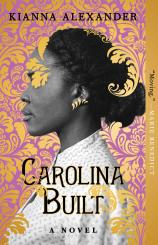Carolina Built
Review
Carolina Built
Kianna Alexander has written a vivid, poignant portrait of real estate magnate Josephine N. Leary in CAROLINA BUILT, an empowering novel of strength and perseverance.
Born into slavery on a plantation, Josephine is one of the younger members of her family to experience freedom for the first time. A voracious reader with a good head for business, she vows not to take her freedom lightly and never again live a life decided by others. She is beside herself with joy when she meets Archer “Sweety” Leary, a man who not only loves her but does not cower in the face of her ambition. Their marriage is not without scrutiny, as Sweety is light-skinned enough to pass as white, whereas Josephine is not. But she feels confident that she can weather any criticism now that she has found an equal partner. In fact, Josephine buys her very first property --- a plot of commercial land in Elizabeth City, North Carolina --- while they are on their honeymoon. From that moment on, they dream of conquering the world together.
"Not only does Alexander shine a bright, necessary spotlight on a little-known figure from history, she successfully renders the setting in a way that provides some terrific historical context that is every bit as interesting to read as Josephine’s story."
When Josephine and Sweety settle in Edenton, NC, they immediately kick-start their future: a business partnership as owners of a barbershop and soon a baby, Clara. But although Josephine continues to carry her share (and often more than her share) of the weight of owning and maintaining a business, her husband starts to bristle whenever she calls herself a co-owner or co-proprietor. Sweety is no stranger to his wife’s ambitions, nor the intelligence and acumen that make them attainable. However, he struggles to put his ego aside, especially as his clients share their outdated opinions when he cuts their hair or gives them hot shaves. As Josephine proves to be a shrewd real estate investor, his discomfort mounts as she continues to buy up businesses and land under her own name.
Still, Josephine does not forget her roles as a wife and mother, and soon they welcome a second daughter, Florence. With her time now split between the business, mothering Clara and Florence, and continuing to tend to her mother and grandmother, Josephine starts to really feel the strain of being a woman --- and a woman of color at that. While her white-passing husband is given much more leeway in social and business encounters, Josephine knows that she must show up twice as put-together, three times as conversant and at least four times as smart. Lucky for her, these traits come naturally, even though the pressure does not.
Alexander walks readers through not only Josephine’s first breath of freedom, but also her first land purchase, her first childbirth and even the beginnings of her involvement in the suffrage movement. While her life is incredible and unforgettable, so too are her relationships with her grandmother, mother and daughters --- four generations of women each living with entirely different versions of freedom and discovering new layers of themselves as a result. Whether or not the men in their lives can keep up is entirely their own problem. Although Josephine and Sweety share a love story for the ages, Alexander does not shy away from pushing them into tense, controversial moments of gender imbalances, in addition to thought-provoking discussions of generational wealth, passing privilege and the value of one’s investments. Through it all, Josephine’s perseverance and refusal to settle make her an invaluable role model.
Not only does Alexander shine a bright, necessary spotlight on a little-known figure from history, she successfully renders the setting in a way that provides some terrific historical context that is every bit as interesting to read as Josephine’s story. Along with being a shrewd, careful businesswoman, Josephine was a visionary for a world where women would be treated as true equals in every sense of the word. In a meeting of a ladies’ auxiliary, she explains to young and old women alike, “Our husbands are our life partners. We love them, respect them, and cherish them. But we must remember that we aren’t their property…. I spent the first nine years of my life toiling in bondage. I married for love, not to trade one set of shackles for another.” The comparison of the shackles of slavery to the bonds of matrimony is certainly apt, but what makes it so empowering is Alexander's delivery: clear-eyed, compassionate and never heavy-handed. She trusts that readers will see the world through her character's eyes.
As much as I loved reading about Josephine buying up pieces of land and maintaining her businesses, my favorite parts of CAROLINA BUILT were the relationships between Josephine and her mother and grandmother, and their various dealings with freedom. Although all three women were able to live freely at some point, Alexander highlights the difference freedom made in their lives at the age of nine versus the age of 50. The younger that each woman was when she experienced freedom (and let’s not forget that Josephine’s daughters were born free), the more choices she had in life, business, schooling and even romance. This revelation may not be new, but the way Alexander celebrates it through the eyes of her characters resonates deeply.
Perfect for readers of Marie Benedict, Martha Hall Kelly and Sadeqa Johnson, CAROLINA BUILT is a necessary addition to the literature on post–Civil War life for freed Black men and women, and a critical reminder of the power of the freedom to dream.
Reviewed by Rebecca Munro on March 18, 2022
Carolina Built
- Publication Date: September 6, 2022
- Genres: Fiction, Historical Fiction
- Paperback: 352 pages
- Publisher: Gallery Books
- ISBN-10: 1982163690
- ISBN-13: 9781982163693




